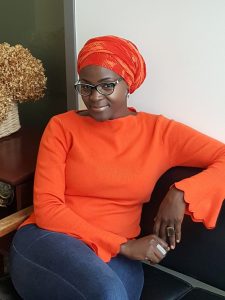PhD Candidate Award Sheds Light on Health Barriers for Black People Living with HIV
June 14/2021
By Françoise Makanda, Communications Officer at DLSPH
Apondi Judith Odhiambo received the Canadian Association for HIV Research 2021 New Investigator Award last month.
She was honoured for her research in unearthing invisible barriers Black people living with HIV face as they enter the Canadian healthcare system.
“I am honoured to receive the award. However, receiving this award in 2021 reaffirms that we are still a long way from ending HIV if we do not address structural violence that is producing and reinforcing inequities in structural and social determinants of health among marginalized communities,” says Odhiambo, a PhD student in the Social Behavioural Health Sciences.
For years, she researched the plight of Black people, particularly immigrants and refugees because she lived through the system’s loopholes seven years ago.
In 2014, Odhiambo was eight months pregnant, newly arrived in Canada from Kenya and couldn’t find a doctor. Her insurance could not cover the birth and she did not know how to navigate the Canadian health care system. Without a referral, she was lost.
“I didn’t know that I had to call somebody. I had to have a gynecologist or an obstetrician. Who is going to refer me? Who’s going to be responsible for delivering my baby?” she asked herself.
She turned to a community healthcare center, but they were full. At the last hour, just four days before labour, she was insured, met her medical team, and safely delivered her baby.
“I had this glorious picture of everything just being smooth,” says Odhiambo. “Most people don’t see the invisible structural forces that constrain access to healthcare for immigrants and racialized communities facing precarity.”
The experience left Odhiambo determined to reveal those invisible forces. She uses institutional ethnography to examine how laws, policies and institutional practices organize Canada’s health system, how they intersect and how they constrain access to HIV care and treatment for Black people living with HIV.
Odhiambo volunteered through community healthcare centers at first to gain Canadian experience. She learned about the plight of other Black immigrants: “I was exposed to all sorts of stories.”
In her findings, Black immigrants with precarious immigration status are excluded from basic care. Most arrive in Canada without access to HIV care resources. Their legal status hampers their ability to get care legally. Barriers include lack of health insurance, drug coverage, long wait times, difficulty finding physicians, systemic and anti-Black racism, stigma and discrimination, says Odhiambo.
“The Canadian healthcare is organized in a way that those who need medical assistance do not have insurance. The medically uninsured can access healthcare through community-based centers. Black immigrants face difficulty even gaining linkage into community healthcare centers because of a lack of information.”
There is also no constitutional mandate to help immigrants. Refugee claimants and protected persons, however, are eligible for care under an interim federal healthcare program but “they are forced to access care through alternative practices like community healthcare centers,” says Odhiambo.
Immigrants who may claim refugee status have a three-month wait period under the Ontario Health Insurance Program which limits access to treatment and exacerbate poor health outcomes, says Odhiambo.
When diagnosed with HIV, Odhiambo says that public health units should show sensitivity in the way they contact trace. “Contact tracing instills fears, and some opt-out altogether. Some even feel that they’re being policed, and the language used supports that.” In her research, Odhiambo recalls a participant using the words ‘surveillance’ and ‘policing.’ “They say: “I don’t want to access care because I don’t want my immigration status to be impacted by my health condition, so I’d rather not engage in care.”
Immigration panel physicians conduct mandatory HIV testing without informed consent, pre and post counselling and referrals to healthcare, says Odhiambo. “It is all about ‘how many sexual partners do you have? Are you telling them that you are HIV positive, and you know you can be criminalized?’
HIV medications are only accessible for those who have money and adequate work as the treatment is expensive. This is another form of structural violence, she adds. “It’s also contributing towards HIV transmission. It’s not only their health outcome that you are disenfranchising, but you’re putting the larger population at risk. Leaving Black communities behind jeopardizes national and global efforts to end HIV by 2030.”
Patients can only discuss one health issue per visit, says Odhiambo. If you have multiple comorbidities including HIV, one visit is not enough.
Most participants in her research were part of the Ontario Disability Support Program (ODSP). That income gives them access to antiretroviral medications. They felt “trapped” in the system because any attempt to leave ODSP is met with uncertain or lost access to healthcare coverage, says Odhiambo. Coupled with food and housing insecurity, several participants she spoke to had mental health issues and underlying comorbidities.
Although used by the uninsured, community healthcare centres “face a lot of structural limitations because they’re underfunded,” she adds. “They can only serve clients from a particular catchment area or postal code. They cannot provide treatment because they’re underfunded.”
If public health and the right to health are important, Odhiambo argues that immigrants should be granted access to basic and necessary healthcare irrespective of legal and employment status. An integrated approach to address their social determinants of health is an important start, she adds.
While she is pleased her work was recognized, she is eager to see a change in the system. “Undertaking a research project among Black communities in the era of COVID-19 and civil rights movements reaffirm that we can no longer downplay the role systemic and anti-Black racism play in perpetuating inequities in health and access to healthcare services and contributing to the uncertainty of ending HIV.”
